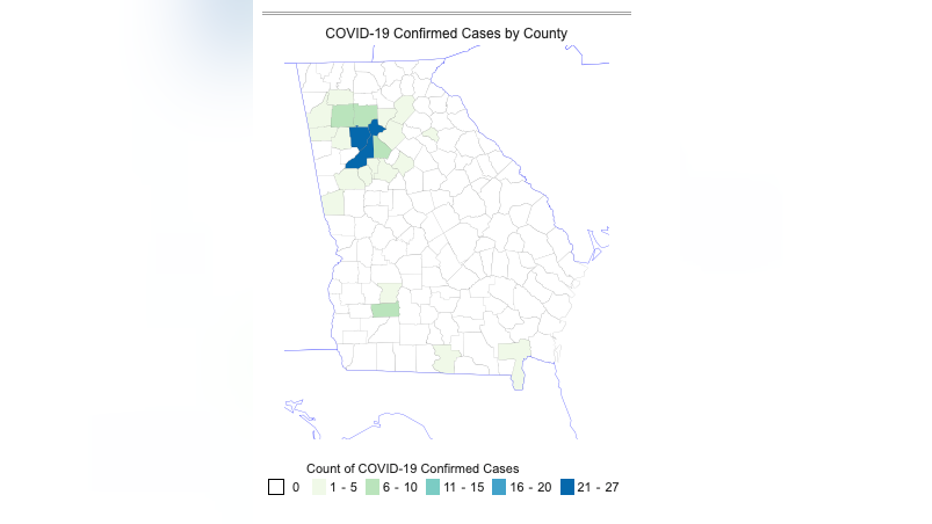121 confirmed cases of coronavirus in Georgia
ATLANTA - Georgia's number of confirmed novel coronavirus cases has passed 100, state health officials announced.

As of Monday at noon, there were 121 cases of COVID-19 in the state. The cases are mostly in metro Atlanta and in northwest Georgia, according to the state Department of Public Health. One person - a 67-year-old man - has already died from the disease.
The cases by county are:
- Fulton - 27
- Cobb - 22
- DeKalb - 10
- Bartow - 9
- Cherokee - 7
- Dougherty - 6
- Clayton - 5
- Fayette - 5
- Gwinnett - 5
- Floyd - 4
- Clarke - 3
- Lowndes - 3
- Coweta - 2
- Gordon - 2
- Henry - 2
- Lee - 2
- Charlton - 1
- Forsyth - 1
- Hall - 1
- Newton - 1
- Paulding - 1
- Polk - 1
- Troup - 1
In the report, health officials say that 44 percent of confirmed cases involve people age 60 or older, people who the Centers for Disease Control and Prevention say are at a higher risk of getting very sick from the illness. The World Health Organization has estimated a 21.9 percent mortality rate for those over 80 who are infected with the virus.
Gov. Brian Kemp declared a public health emergency for the State of Georgia Saturday in response to the coronavirus outbreak. The declaration allows resources to be marshaled for the treatment and mitigation of the virus.
The governor's announcement came following President Donald Trump's Friday declaration of a national emergency over the coronavirus outbreak. The president announced $50 billion for states, territories, and localities in the shared fight against the disease.
In Atlanta, Mayor Keisha Lance Bottoms declared a state of emergency within the city limits, banning large public gatherings of more than 250 people until March 31.
List of tourist locations closed in Atlanta due to coronavirus
The president also announced that emergency operations centers would open effective immediately. The president said that every hospital is to activate its emergency preparedness plan to meet the needs of Americans everywhere.
"No resource will be spared, nothing whatsoever," the president said, and that half a million additional testing kits would be available early next week. Locations would be announced Sunday night. In the press conference, it was announced that interest on federal student loan payments would be waived during the emergency.
In a 363-40 vote early Saturday, the U.S. House of Representatives approved a coronavirus response package negotiated by House Speaker Nancy Pelosi and Treasury Secretary Steven Mnuchin.
Georgia is building temporary housing units to house quarantined patients who have nowhere else to go at the Georgia Public Safety Training Center in Forsyth, northwest of Macon.
Georgia lawmakers had already agreed with Gov. Kemp’s plan to dip into the state’s rainy day fund for $100 million that the Republican governor can spend to combat COVID-19.
List of Georgia colleges, universities, public schools and churches closing
The $100 million would come from the state’s $2.8 billion in reserves and go to the governor’s emergency fund. Lawmakers said Georgia could use the money to provide a match for federal funds as well as for other state spending. England said there’s an additional $5 million provided to rural hospitals as well to pay for effects of the new coronavirus.
Despite the new money, the plan still cuts $159 million from other spending in the state budget year that runs through June 30.
Public health officials have urged social distancing to slow down or stop the spread of coronavirus. According to the Centers for Disease Control and Prevention, adults who are 60+ and people with serious medical conditioners, such as heart disease and diabetes, are at higher risk of getting very sick from coronavirus.
Best prevention measures:
- Wash your hands often with soap and warm water for at least twenty seconds.
- If soap and water are not available, use an alcohol-based hand sanitizer.
- Avoid touching your eyes, nose, and mouth with unwashed hands.
- Avoid close contact with people who are sick.
- Stay home when you are sick.
- Cover your cough or sneeze with a tissue, then throw the tissue in the trash.
- Clean and disinfect frequently touched objects and surfaces
The Associated Press contributed to this report.

